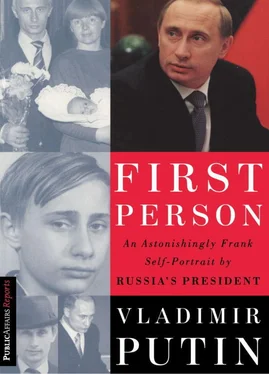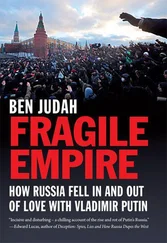Vladimir Putin
with Nataliya Gevorkyan, Natalya Timakova, and Andrei Kolesnikov
FIRST PERSON
An Astonishingly Frank Self-Portrait by Russia’s President Vladimir Putin
“In fact, I have had a very simple life. Everything is an open book.
I finished school and went to university.
I graduated from university and went to the KGB.
I finished the KGB and went back to university.
After university, I went to work for Sobchak.
From Sobchak, to Moscow and to the General Department.
Then to the Presidential Administration.
From there, to the FSB.
Then I was appointed Prime Minister.
Now I’m Acting President. That’s it!”
“But surely there are more details?”
“Yes, there are….”
We talked with Vladimir Putin on six separate occasions, for about four hours at a time. Both he and we were patient and tolerant; he, when we asked uncomfortable questions or were too invasive; we, when he was late or asked us to turn the tape recorder off. “That’s very personal,” he would say.
These were meetings “with our jackets off,” although we all still wore ties. Usually they happened late at night. And we only went to his office in the Kremlin once.
Why did we do this? Essentially, we wanted to answer the same question that Trudy Rubin of the Philadelphia Inquirer asked in Davos in January: “Who is Putin?” Rubin’s question had been addressed to a gathering of prominent Russian politicians and businessmen. And instead of an answer, there was a pause.
We felt that the pause dragged on too long. And it was a legitimate question. Who was this Mr. Putin?
We talked to Putin about his life. We talked—as people often do in Russia—around the dinner table. Sometimes he arrived exhausted, with drooping eyelids, but he never broke off the conversation. Only once, when it was well past midnight, did he ask politely, “Well then, have you run out of questions, or shall we chat some more?”
Sometimes Putin would pause a while to think about a question, but he would always answer it eventually. For example, when we asked whether he had ever been betrayed, he was silent a long time. Finally, he decided to say “no,” but then added by way of clarification, “My friends didn’t betray me.”
We sought out Putin’s friends, people who know him well or who have played an important role in his destiny. We went out to his dacha, where we found a bevy of women: his wife, Lyudmila, two daughters—Masha and Katya—and a poodle with a hint of the toy dog in her, named Toska.
We have not added a single editorial line in the book. It holds only our questions. And if those questions led Putin or his relatives to reminisce or ponder, we tried not to interrupt. That’s why the book’s format is a bit unusual—it consists entirely of interviews and monologues.
All of our conversations are recorded in these pages. They might not answer the complex question of “Who is this Mr. Putin?,” but at least they will bring us a little bit closer to understanding Russia’s newest president.
NATALIYA GEVORKYAN NATALYA TIMAKOVA ANDREI KOLESNIKOV
Principle Figures in First Person
People
VADIM VIKTOROVICH BAKATIN:
USSR interior minister (1988–90); chairman of KGB (1991); presidential candidate.
BORIS ABRAMOVICH BEREZOVSKY:
Prominent businessman influential in political affairs; part-owner of ORT, pro-government public television station; former deputy secretary of Security Council, October 1996—November 1997; involved in the Chechen conflict; appointed executive secretary of the Commonwealth of Independent States (CIS); dismissed by Yeltsin in March 1999, elected member of parliament from Karachaevo-Cherkessia in December 1999.
PAVEL PAVLOVICH BORODIN:
Chief of staff in the presidential administration from 1993 to 2000; In January 2000, appointed state secretary of the Union of Belarus and Russia.
LEONID ILYICH BREZHNEV:
General secretary of the Communist Party of the Soviet Union from 1964–1982.
ANATOLY BORISOVICH CHUBAIS:
Vice premier in the Chernomyrdin government (1992) and government (1994); appointed member of the government commission handling privatization and structural adjustment in 1993; appointed first deputy chair of the government in 1994 and dismissed by Yeltsin in January 1996; appointed by Yeltsin to post of chief of presidential administration in July 1996; Minister of Finance, March—November 1997.
VLADIMIR CHUROV:
Deputy chair of the Committee for Foreign Liason of the St. Petersburg Mayor’s Office in Sobchak administration.
MICHAEL FROLOV:
Retired colonel, Putin’s instructor at the Andropov Red Banner Institute.
VERA DMITRIEVNA GUREVICH:
Putin’s schoolteacher from grades 4 to 8 in School No. 193 in St. Petersburg.
SERGEI BORISOVICH IVANOV:
Foreign intelligence career officer with rank of lieutenant general; appointed deputy director of FSB in August 1998; appointed secretary of the Security Council in November 1999.
KATYA:
Putin’s younger daughter.
SERGEI VLADILENOVICH KIRIENKO:
First deputy minister of energy in 1997; appointed chair of the government (prime minister) in April 1998 and dismissed by Yeltsin in August 1998, elected member of parliament from the party list of the Union of Right Forces.
ALEKSANDR VASILYEVICH KORZHAKOV:
Hired as Boris Yeltsin’s bodyguard in 1985 when Yeltsin was first secretary of the Moscow City Party Committee and continued to manage Yeltsin’s security in subsequent positions; awarded the rank of general in 1992; joined the Yeltsin election campaign in 1996 and was dismissed from all his posts in June 1996 after disagreements about how to run the campaign.
VLADIMIR ALEKSANDROVICH KRYUCHKOV:
Chairman of the Soviet KGB (1988–91) until arrested for the August 1991 coup; amnestied in February 1994.
YURI LUZHKOV:
Mayor of Moscow.
MASHA:
Putin’s older daughter.
YEVGENY MAKSIMOVICH PRIMAKOV:
Pravda columnist and former director of the USSR Institute of Oriental Studies and the Institute of World Economy and International Relations, first deputy chairman of the KGB (1991), director of the Soviet Central Intelligence Service (1991), and then director of the Russian Foreign Intelligence Service (1991–1996); appointed Foreign Minister January 1996 and again in 1998; appointed by Yeltsin’s decree to the position of chair of the government (prime minister) in September 1998 and dismissed by Yeltsin from this position in May 1999; elected to the State Duma (parliament) from the party list of Fatherland—All Russia in December 1999.
LYUDMILA PUTINA:
Vladimir Putin’s wife (nicknames found in text: Luda, Ludik).
SERGEI ROLDUGIN:
Lead cellist in the Mariinsky Theater Symphony Orchestra, a friend of the Putins, and godfather of Putin’s older daughter, Masha.
EDUARD AMVROSIEVICH SHEVARDNADZE:
Soviet foreign minister (1985–91) who resigned in protest of the impending coup; co-chairman of Democratic Reform Movement (1991–92); head of state and chairman of parliament of Georgia.
ANATOLY ALEKSANDROVICH SOBCHAK:
Mayor and chair of the government of St. Petersburg (Leningrad) from 1991 to 1996; co-chairman of Democratic Reform Movement (1991–92); member of the Russian Presidential Council since 1992; died in February 2000. His wife is Lyudmila Borisnova.
Читать дальше













